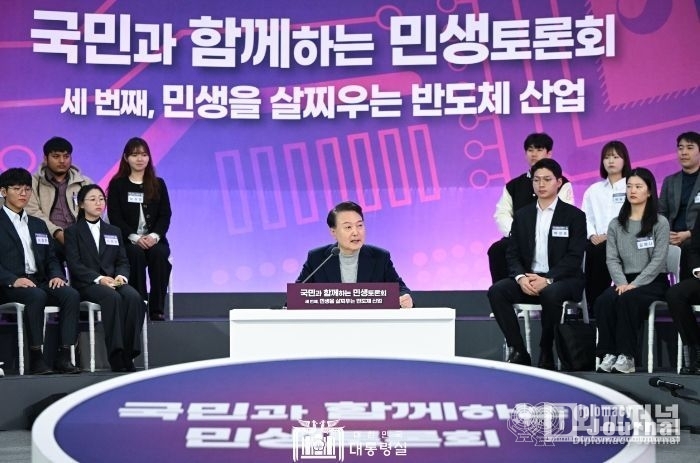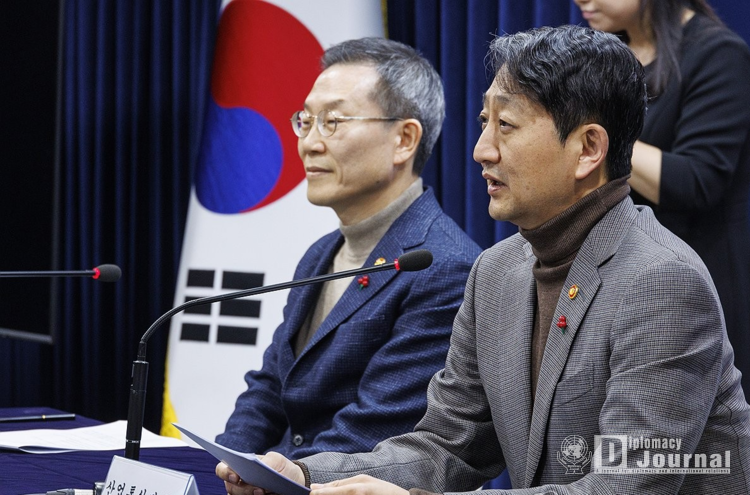By Lee Jon-young
President Yoon Suk-yeol held the third "Public Debate with the People" on Jan. 15 on the theme of "Semiconductor Industry that Fattens People's Lives" at the Semiconductor Hall of Sungkyunkwan University's Natural Science Campus in Suwon, Gyeonggi-do, one of the leading semiconductor workforce training institutions.
Following the economic policy direction (Jan. 4, Thursday) and housing (Jan. 10, Wednesday), this discussion was organized to hear the voices of the people, including businesses, local residents, and students, on how to create a semiconductor mega cluster, and to bring relevant ministries together without partitions to find solutions to problems.

In his remarks, the President emphasized that the semiconductor industry enriches people's lives and creates high-quality jobs more than any other industry. He explained that the establishment of a semiconductor factory creates a semiconductor ecosystem, including design, post-processing companies and R&D facilities, and leads to the construction of electricity and water-related infrastructure and joint investment by suppliers, creating millions of jobs, which in turn revitalizes local commercial districts and spreads warmth throughout the country through a tightly connected supply chain.
In particular, the President said that the semiconductor mega-cluster in the southern part of Gyeonggi Province will create at least 3 million new good jobs if investments totaling more than 622 trillion won are made, and promised to invest the country's resources to make it a success.
He also emphasized the need to expand nuclear power plants that provide high-quality electricity, saying that even a single semiconductor factory production line requires more electricity than is used in Daejeon or Gwangju, cities with a population of 1.4 million.

He also expressed his intention to continue to apply the semiconductor investment tax credit, which ends this year, and strengthen diplomatic relations with allies and friendly countries to strongly support the semiconductor industry.
Following this, Minister of Science and ICT Lee Jong-ho and Minister of Trade, Industry and Energy Ahn Deok-geun announced specific support measures under the theme of 'Semiconductor Mega Cluster Creation Plan'.
To create a semiconductor mega cluster, the two ministers proposed support measures such as enhancing investment incentives such as investment tax credits for infrastructure investments such as power and water, strengthening the competitiveness of small and fabless companies, creating a semiconductor ecosystem through global solidarity, securing semiconductor super-gap technologies, fostering excellent human resources, and attracting overseas talents.
In the discussion that followed, participants from all walks of life shared their experiences and opinions on three topics: the public benefits of semiconductor mega clusters, semiconductor super-gap technology development, and fostering innovative talent.
Semiconductor exposure equipment company ASML, a key player in the Korea-Dutch Semiconductor Alliance, and Samsung and SK officials, who are planning to make large-scale investments in the mega cluster, offered advice for the success of the cluster, while Yongin residents and semiconductor students showed strong expectations for the local economy and job effects of the semiconductor mega cluster.
Semiconductor companies expressed their determination to compete in the global semiconductor market, while professors, postdoctoral researchers, and undergraduate students studying semiconductors expressed their expectations for global research cooperation and expanded educational support to secure world-class technology.
The discussion was attended by more than 20 students majoring in semiconductors, representatives of semiconductor-related companies such as ASML Korea President Lee Woo-Kyung, academics such as Kwon Seok-Jun, a professor of chemical engineering at Sungkyunkwan University, researchers such as Lee Jung-Hyun, a senior researcher at KIST, and residents of Yongin, Gyeonggi-do.
The government was represented by Minister of Science and ICT Lee Jong-Ho, Minister of Trade, Industry and Energy Ahn Deok-geun, and local governments by Yongin Mayor Lee Sang-Il and Icheon Mayor Kim Kyung-Hee, and the President's Office by Secretary Lee Kwan-Sup, Policy Chief Sung Tae-Yoon, and Chief Economic Advisor Park Chun-Sup.






